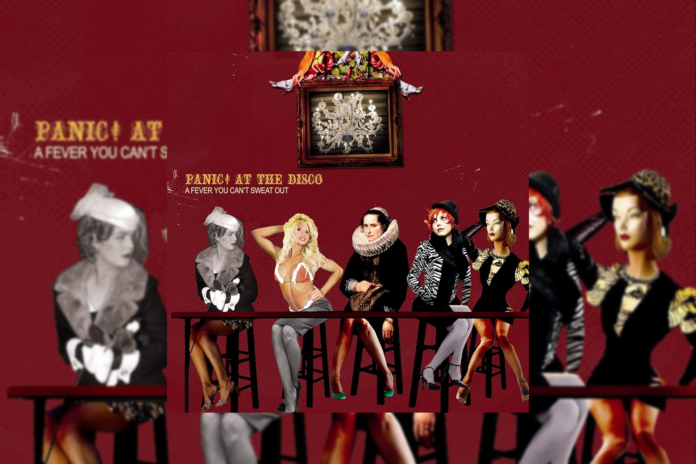
Panic! At the Disco released “A Fever You Can’t Sweat Out” almost two decades ago on Sept. 27th, 2005. Their debut studio album, the band formed in 2004 and was discovered by Fall Out Boy’s Pete Wentz through the demos the band posted online, leading to Wentz signing them to his label Decaydence. The group had only just recently graduated from high school prior to beginning their recordings for the album, what came was an experimental album that tested both critics and what pop and punk-rock could become, as it was slowly turning into a dying genre at the time of its release.
A lot of the songs on the album are remembered, (or forgotten) for their extremely long names. “London Beckoned Songs About Money Written by Machines”, “Lying is the Most Fun a Girl Can Have Without Taking Her Clothes Off”, and especially “There’s a Good Reason These Tables Are Numbered Honey, You Just Haven’t Thought of It Yet”.
An album that both polarized critics and created something not done before in the pop-rock and punk world from the electronica and synths to its use of traditional instruments like the accordion and bass. Critics went after its so-called “uncreativity”, but the album tried multiple things throughout it in terms of creativity. Starting with its pop-like beginning that has a danceable feel to it, to its baroque-pop ending. Pitchfork.com rated it a 1.5 out of 5 because of the “whininess” and “emphasis of heartbreak” on the album, but what would you expect from a group of teenagers venturing into the pop-punk scene? One of them was bound to have experienced some sort of heartbreak prior.
“Camisado” is a good example of a song worth dancing to, but with a heartbreaking influence to it. It was written by lead guitarist Ryan Ross and was about his father who was struggling with an alcohol addiction and was in and out of the hospital during the early part of the band’s career. A majority of the songs on the album were written by Ross and inspired by things that he experienced during his life. The synth used in the song takes it to a whole new level to go along with singer Brendon Urie’s lyrics and drummer Spencer Smith kills it during the climax of the song leading up to Urie’s rehash of the opening.
“I Write Sins Not Tragedies” is considered the hit single of the album, and is probably what most are familiar with from the band. The song was written by Ryan Ross after a breakup that may have been due to unfaithfulness from his partner. It’s about a wedding where the groom overhears that his bride may have been unfaithful with the overall message revolving around breakups and sin. A true punk-rock statement, everything about this song is what the band originally set out to be, angst but with a touch of experimentation trying to revolutionize the more traditional rock aspects of the song with some melodic verses from Urie especially near the climax of the song. Panic’s most successful and game-changing single to date.
“Build God, Then We’ll Talk” is the finishing song on the album, and all of the build-up throughout the album makes this an epic finish. Another song possibly about toxic relationships and infidelity, the combination of rock and baroque-pop doesn’t separate it from the pack in terms of creativity, but Urie’s vocals create another hit with his vocals ranging from melancholic to pure rock, the bass solo near the end of the song is also pure ecstasy leading up to finale combining Ross’s guitar playing, Smith’s drums, and the bass to create an amazing ending that left a lot of fans fiending for more.
“A Fever You Can’t Sweat Out” was criticized for apparently lacking creativity, however, it is far from original. Ross and Urie tested the punk landscape and reinvigorated the interest in a genre that was believed to have been dying out. The album leaves new and old fans divided because of the roots Urie left behind in favor of pop for the band’s future with him being the only remaining member of the original four after Smith left in 2015. What made the album so good was the audience it could speak to, creating an album that could find ways to speak to the masses and defy genres with the combination of pop and punk rock, and that led to a timeless classic almost 20 years later.
For comments/questions about this story DM us on Instagram @thewhitatrowan or email the.whit.arts@gmail.com.





